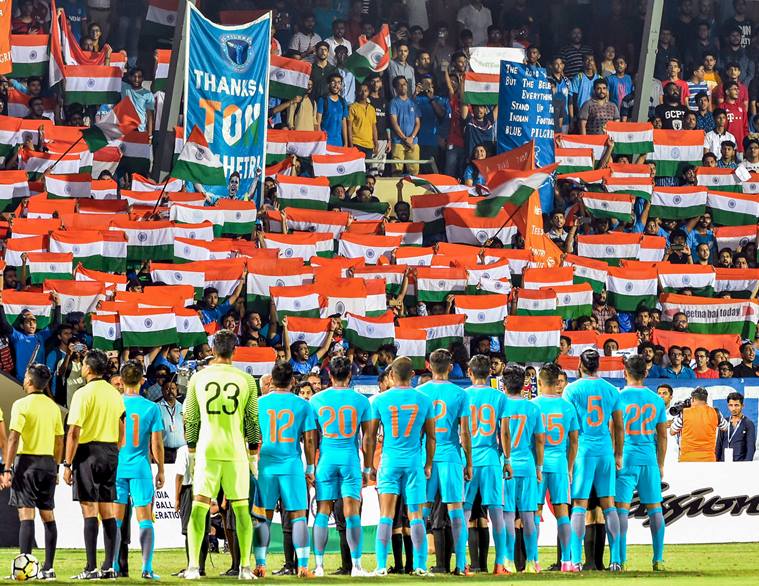 Mumbai: Indian football team before the start of the match against Kenya during the Hero Intercontinental football Cup, in Mumbai. (PTI Photo/File)
Mumbai: Indian football team before the start of the match against Kenya during the Hero Intercontinental football Cup, in Mumbai. (PTI Photo/File)
The feeling sinks in when the tournament actually kicks off. The opening match of the World Cup between Russia and Saudi Arabia might not have been a high-profile one from a fan’s point of view. But deep down, all I could think was” “I wish I was playing… I wish I was playing”.
It’s a dream for every professional footballer to play in a World Cup. Over the last one month, teams like Panama, who qualified for the first time, have given us a sense of belief that one day, we too can qualify. When, no one knows. But we shouldn’t stop believing.
My first World Cup memory is of the German great Oliver Kahn. I didn’t see many matches of the 2002 World Cup on television — just the final. But a year or so after the tournament, my goalkeeper trainer at St Stephen’s School in Chandigarh gave me a CD that had all saves by Kahn. I watched every second of that tape on a loop and it set me off on a path that would eventually take me to the national team. Along the way, I’ve played club football in Kolkata, Norway and now Bengaluru.
But at every step, I have had people tell me how they won’t see an Indian team play in a World Cup during their lifetime. Some remarks have been snide, some sympathetic. But trust me, we don’t need any reminding. How does it feel for an Indian footballer to watch a World Cup, you ask me? There’s disappointment, for sure. But we, the players, are also more realistic than others.
I remember the mood in the dressing room before our match against Oman in Bengaluru three years ago. It was the opening game of the 2018 World Cup qualifying campaign but none of us were even thinking about Russia. Our only target was to do well in that match and see how it goes from there. We eventually did not qualify but there were some matches that will remain with us for the rest of our lives.
For instance, the one against Iran in September 2015. That match in Bengaluru was played at an intensity very few of us had experienced before. However, we made life difficult for Asia’s best team by keeping our shape and running the extra yard. It was the same Iran team that troubled Spain and Portugal in the World Cup. I was with (India teammates) Sunil Chhetri and Robin Singh watching those games, and we felt proud — we had done to Iran what they did to the likes of Spain and Portugal.
But as professionals, we also know what ails our football and the areas we are good at. We are a team in transition. It is a slow process but we are moving forward, one step at a time. People don’t see that very clearly because we want results very fast. But this is going to take time.
During the 2014 World Cup, I was playing club football in Norway. When they failed to qualify back then, people were upset and very critical of the team. They thought, “if Sweden can, why can’t we?” But it put into perspective a thing or two for me.
Norway doesn’t lack infrastructure and their footballing culture is much better than ours. The country’s footballers play in the Premier League, Bundesliga and other top leagues across Europe. Yet, they couldn’t make the cut. It shows just how difficult it is to qualify for the World Cup.
You still feel the disappointment when you don’t but then, you look at the next best thing and hope to qualify for that. For us, that is the Asian Cup. The championship, which will be held in the UAE next January, is like the World Cup for us. We have qualified for the Asian Cup for the first time since 2011 and going by the performances by the region’s teams in Russia, the tournament promises to be of very high standard.
There are lessons from Russia that the Indian team can apply in UAE. Over the last one month, I and Sunil were discussing how the World Cup has changed — in the sense that there are no favourites. Teams like Japan, Iceland, Iran and South Korea have shown that if you have a plan, you will succeed one way or the other, even if the other team has won the World Cup multiple times. You need to put in great effort and stay disciplined to achieve that, but it is no more impossible.
We need to have that mentality. It is important to overcome the mental barrier and not be scared of big teams. Performances by some of the teams have given us the belief that we, too, can cause an upset or two. We have been doing that of late, and the results are to be seen. We now need to take the next step, and hopefully, it will be seen at the Asian Cup.
As footballers, we feel the pain of not qualifying for the World Cup more than the others. But that shouldn’t make us stop believing. If there’s one thing this World Cup has taught us, then, it is that belief is everything.